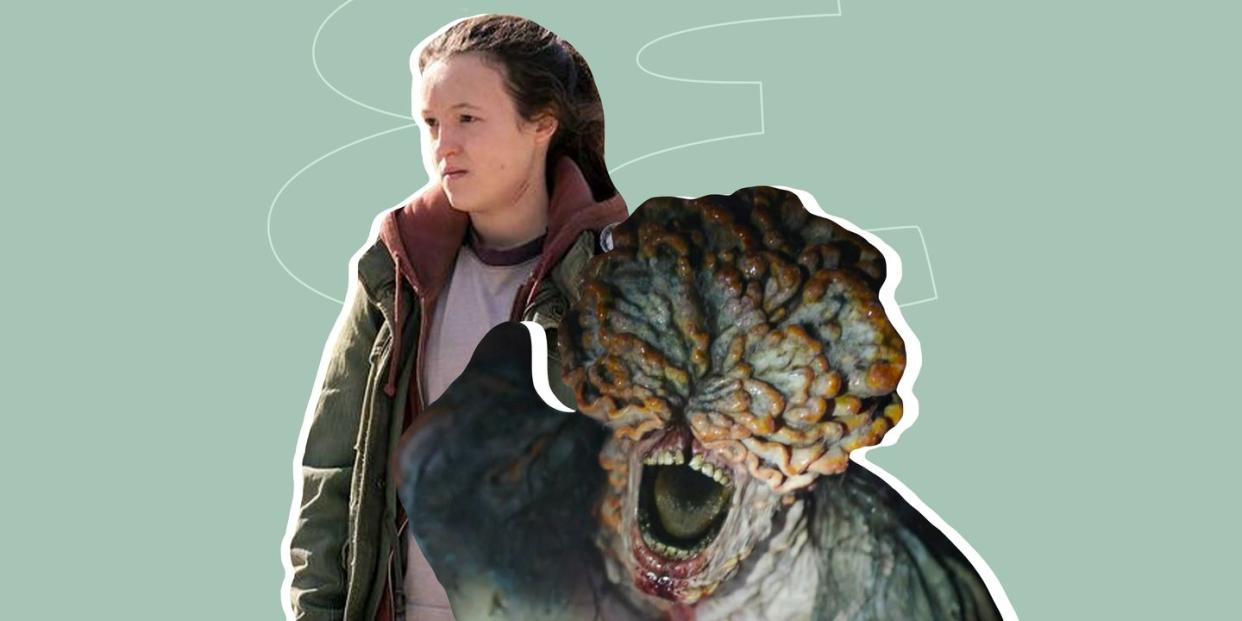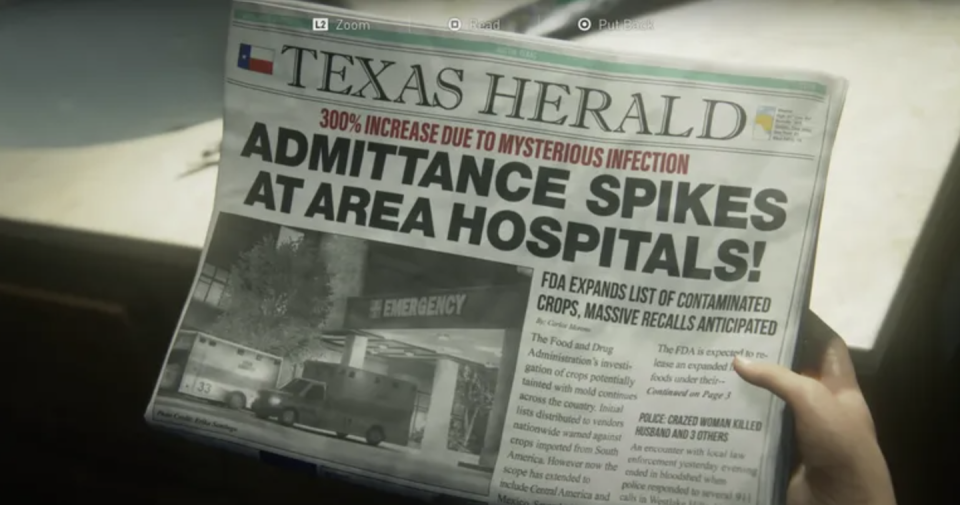We Asked a Mycologist About 'The Last of Us' and It Got Weird

HBO’s new hit series, The Last of Us, begins with a warning. During a fictional broadcast in 1968, a doctor and a scientist debate the danger of a looming pandemic. The doctor is focused on a viral outbreak—but the scientist is more worried about fungi. “Viruses can make us ill, but fungi can alter our very minds,” he pleads. The scientist explains that under the right conditions, an ordinary fungus can mutate, infect, and kill humans. Cue the apocalypse. “There are no treatments for this,” he says. “No preventatives, no cures.”
Sounds dire, right? Well fast-forward 20 years and—yeah, you guessed, it—a fungal outbreak has overthrown society. Season One of The Last of Us, which is based on the best-selling video game of the same name, takes place after the pandemic begins. With most of the population dead and zombified, the remaining humans resort to brutal survival tactics. Just about all hope is lost until a child named Ellie (Bella Ramsey) learns that she’s immune to the disease. In order to get her to a team of specialists, Ellie’s caretakers hire Joel (Pedro Pascal), a ruthless traveler, to smuggle her across the border. In a world of corrupt governments, desperation, and death by fungi looming around every corner, the unlikely duo has to count on each other to survive.
As far as dystopian dramas go, The Last of Us has the perfect setup. The fungal infection, societal collapse, and, of course, HBO’s movie-worthy budget, make it all seem plausible. But is it? Should we be afraid of the mysterious cordyceps? Is it possible that viscous fungi could disrupt our world too?! Well, dear reader, as a certified nosy individual I found someone who could give us some answers.
Meet Matthew Kasson, a mycologist (AKA fungus expert) and associate professor at West Virginia University. Below, Kasson chats with Esquire about the logistics of The Last of Us and those pesky fungi that destroyed their world.
ESQUIRE: Have you seen The Last of Us?
MATTHEW KASSON: I have.
Tell me more.
I think it's a great show. But like any good science fiction, there's a lot more fiction than science. As a mycologist, someone who studies fungi, I obviously pay attention to the realistic aspects of things. And this is definitely based on a real-life fungus. Where we draw the line between science and fiction is the idea that this type of fungus, which impacts ants and other insects, can jump to humans.
So the way the fungus functions isn't fully accurate?
The biggest thing is that, in order for a fungus to learn how to trick its host—the way that cordyceps can kind of trick the ants to spread the spores for it—takes millions of years of evolutionary history for those specialized relationships to develop. So, the likelihood that something so specialized can then jump from an animal far removed from humans is where it becomes far-fetched.
If you were working on the show, what would you do to make it more realistic?
So, here's the thing: the reason they use this fungus system as the main antagonist in the show is because it's so cinematically spectacular. To have a fungus erupt out of the head of an infected individual and have be fixed in place to be discovered later on. It's mind-blowing to see. In the first episode when they enter through that train station to find the battery—they see that cadaver on the wall. In the second episode, you see one as well, when they're overtaken by the fungus—and there are all these elements of the fungal fruiting body all over the corpse. I mean, that just stops you, right?
It stops mycologists like myself who study these on insects when we see them in the wild. We do encounter them like that—glued on the underside of a leaf, or glued to the stem of a tree in an actual setting. But some of the aspects of how this fungus spreads in the show is is unrealistic.
That makes sense.
So I'll give you an example. The ant fungus, the cordyceps that affect ants, coerces them to climb to a high perch. And then they bite down and do something called a death grip. Once they leave their death grip, they die—and then the fungus erupts out of their body postmortem. Once the fungus erupts, it spreads toward unsuspecting ants below. So the spores then land on the other ants. We call that a summit disease because the infected individuals are summiting, and then the spores are falling down onto other close insects nearby. But if that’s the case in the show, then why are they kissing and there’s mycelial contact in the mouth? It’s mixing and matching elements of fungi and other parasitic organisms into one super-organism.
Gotcha. The Last of Us alludes to the pandemic starting from a batch of contaminated flour. Is that realistic? Can food contamination lead to a pandemic?
No, but I think the reason they bring up the flour mill is that a lot of grains provide a good substrate for fungal growth. In fact, you might have heard of the fungus called Ergot. There's this fungus that infects rye grain, and when consumed by humans, [it has] caused them to hallucinate. There's some speculation that The Salem Witch Trials happened because of a massive outbreak of this fungus. Basically, people were delirious and hallucinating that everyone was a witch. There are certain fungi that can contaminate our food sources, which could make us really sick. And we know about those, but they're not contagious. They contaminate our food sources, but only people that consume it will get sick.
Well, that’s good to know! What was it like for you seeing a mycologist featured on a television show?
It's great! Fungi are often vilified or villainized because we associate them with decay and death—because they’re always breaking down things, or breaking down substrates. They're breaking down dog poop in our yard, you know. So when we see them, we're kind of grossed out by them. But they do amazing things. And if it takes the hook of Hollywood to get people talking about fungi, that's okay... There are a lot of people in the medical community that work on fungal pathogens that have been doing good work, but it's grossly underfunded compared to bacterial diseases or viruses.
Why is that?
We're still in a COID pandemic—we're more focused on viruses. But it turns out that a number of these people that were impacted by COVID are more susceptible to fungal infections of the lung, because they’re now compromised by the virus—which sets them up for fungal infection. That's no different than what happened with HIV/AIDS in the '80s. You know, a lot of those patients basically were ultimately taken out by fungal infections.
Oh, really?
Yeah, they were saying, "Well, why are these patients getting fungal infections? And it turns out it was because of a dampened immune response. They were on steroids, which allowed for a better, suitable, environment for fungi to colonize.
That's interesting.
There are definitely fungi that can infect healthy individuals. But we tend to maybe miss or ignore the fact that there are millions of Americans out there dealing with fungal infections every day. Dandruff, for example. That's a fungus. There's a number of us that have Head and Shoulders in our shower. It's because we're battling, oil gland-loving fungus on our scalps. The same thing with toenail fungus, ringworm, and, of course, yeast infections.
The mycologist in the show suggests that the military should drop a bomb on the city where the infection began. Is that just high-stakes Hollywood craziness?
I think that’s the high-stakes Hollywood component. I mean, I'm not so cavalier when talking about like the loss of human life—and most people outside of, you know, a Hollywood production wouldn't be either. In the opening scene of the first episode, they talk about how we have no treatments and things like that, but there are antifungals that are administered orally and through IV. They could try those on infected individuals. There are more options, medically speaking, than maybe the show lets on.
Yes, they’re working with a very hopeless mindset. So how do mycologists generally tackle an outbreak or the generation of a new fungus?
There’s actually two that are going on right now. For example, there's a mass die-off of amphibians. You might have heard about this, maybe — but a lot of frogs are dying from a fungus called the chytrid fungus.
That's something that people are dealing with. They're trying to understand how it spreads. Any good epidemiology is understanding the origins of where it came from, where its current distribution is, and [the] ways to slow the spread until they can get enough research to figure out how to develop a vaccine or some kind of a control measure.
With a lot of these things, because there are limited options, it's mostly about slowing the spread, so we can better understand its biology.

Why do you think people are drawn to a show like this—a show about a pandemic, while we're still living through one?
I think the concept of the cordyceps itself is stranger than fiction. This idea that there are these behavior-modifying parasites that could invade the host? I think that's really captivating. I mean, science fiction at the end of the day is based partially on science. It’s stretching what we know from science and taking this exaggerated leap forward with it.
You're right. Why do people that are living through, and still experiencing, or have gotten sick from COVID—why are they so obsessed with something that spreads like wildfire? I don’t know. We've had other shows like Contagion and other movies—and I think as much as we were afraid, we're still going to watch in horror. We feel safe maybe from our living room, watching the horror unfold. Maybe if we can somehow convince ourselves that we're protected from this fictitious pandemic, we could also convince ourselves that we are protected against a real one.
Are there any aspects of your job that seem normal to you, but would be funny to somebody else?
Definitely. Related to the show, I receive dead insects in the mail all the time with fungal infections. I’m often very excited when they arrive. If someone else would receive a box of dead cicadas with their butts falling off because the fungus has burst out of their back end, I think they'd be in shock and horror. And maybe require a stiff drink.
If you were dropped into an episode of The Last of Us, do you think you would survive?
I think I could do pretty well. I have some outdoor skills as a person who grew up in the woods and fell in love with trees and fungi. That's where I spend a lot of my time. If I'm not in the lab studying fungi, I'm out collecting. I spend large amounts of time in very remote locations, alone, often with a pocket knife for cutting things—or axes for chopping down, you know, infected trees.
Oh, yeah. You’d be fine.
I have the tool kit and am sometimes wielding a chainsaw. So, yeah, I think I can make do.
You Might Also Like

